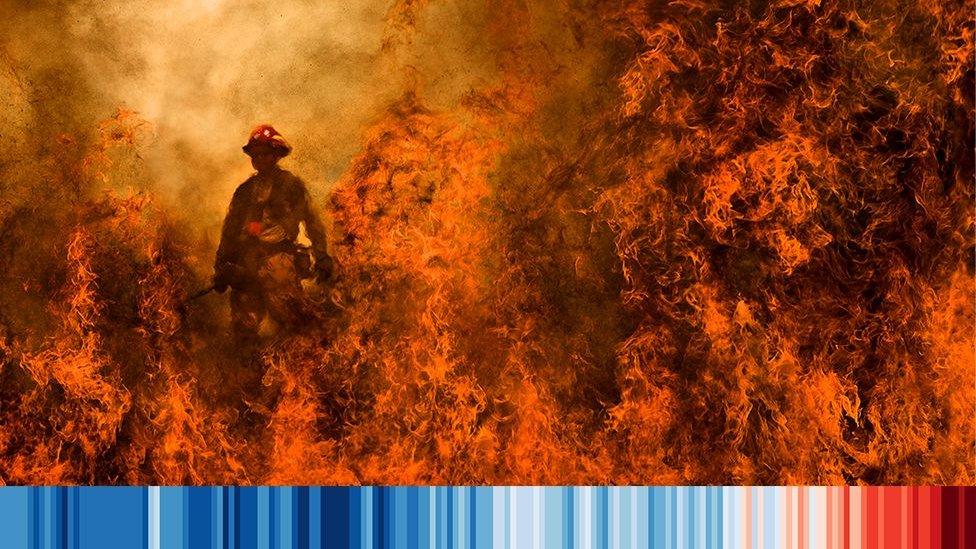Climate change: Greenland's culture shifts as Arctic heats up
- Published
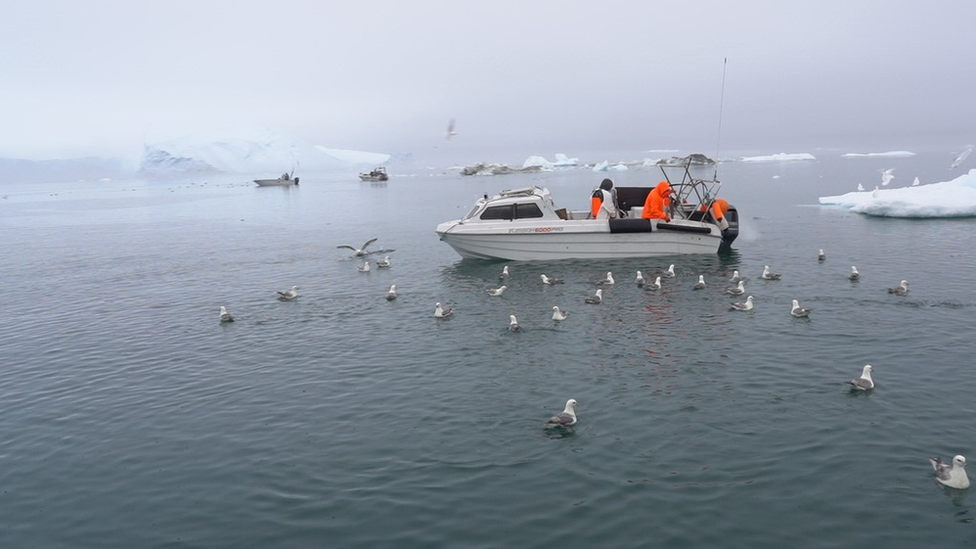
No longer able to cross the sea-ice with sleds, Kaleeraq Mathaeussen now only fishes by boat
Icebergs bigger than city blocks loom through the mist as Kaleeraq Mathaeussen reels in halibut from the frigid waters one by one.
"Each season is not how it used to be," he says. It's become windier and more unpredictable.
More than 250km (155 miles) inside the Arctic Circle, the coastal town of Ilulissat in western Greenland is also a busy port.
Kaleeraq has been fishing the waters here since he was 14 years old and, like other locals, has observed changes around him.
In winter he used to travel on the ice with a sled pulled by his dogs. But the sea no longer freezes like it used to.
"Ever since 2001 I noticed the winter seasons in Disko Bay didn't have as much ice," he says.
"I was very worried when I started to notice that the ice barrier was getting weaker and witnessing such an astronomical change in the climate," he explains.
"Today it is unpredictable and too dangerous to go fishing with my sled dogs," he explains. He stopped sledding two years ago and now he only fishes by boat.
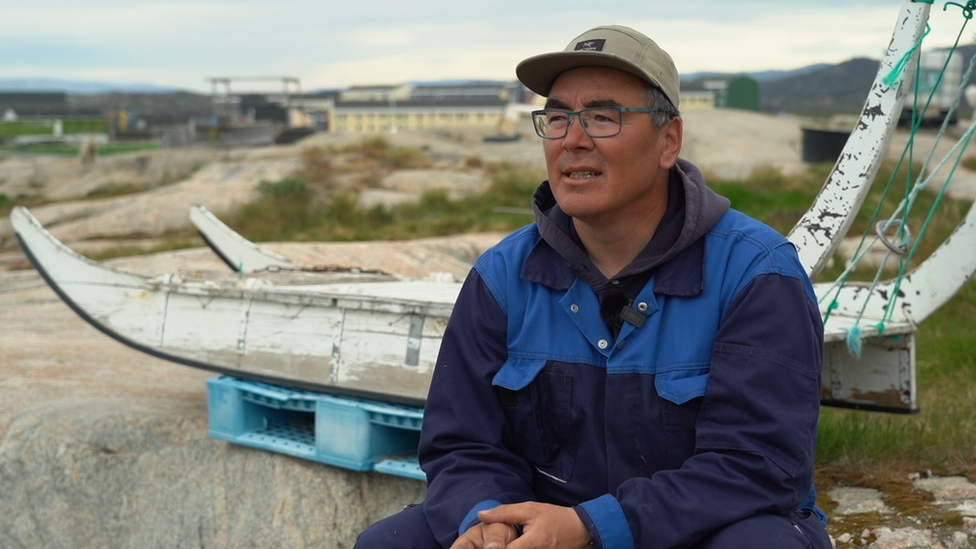
Kaleeraq Mathaeussen has been fishing Ilulissat's icy waters since he was 14
Communities in northern Greenland have lived in one of the world's toughest environments for centuries.
But temperatures have risen faster in the Arctic region than elsewhere on earth, and the impact of climate change is being felt on the local way of life.
On the outskirts of Ilulissat, colourful apartment blocks overlook a field that's home to dozens and dozens of dogs.
Kaleeraq still owns more than 30. Before he used his dogs for tourism, but now only keeps them for his teenage son. "I still miss that way of life, but it just has to be like this for now," he says.
Dog-sledding has been a long-held tradition in the north and east of Greenland. But many local hunters and fishermen have given it up and the number of sled dogs has slumped nationwide.
Around two decades ago there were around 5,000 dogs in Ilulissat alone, but now there are only about 1,800, says Flemming Lauritzen, who runs a dog-sledding tour business with his wife Ane Sofie.
When she was growing up sled dogs were always around, she says. "I'm not happy to see [the dogs] disappearing from our culture."
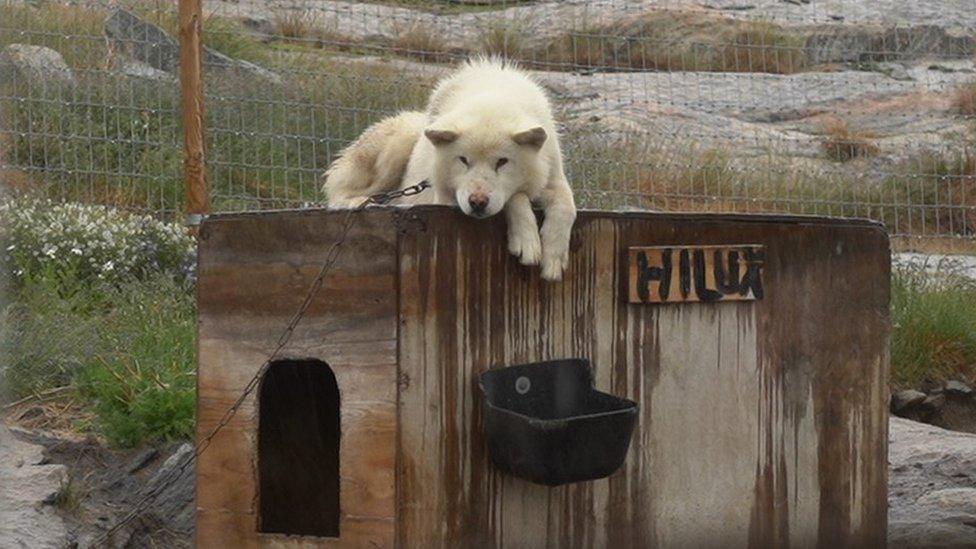
Greenlandic sled dogs are a unique breed, but their numbers have declined
Diseases and snowmobiles are partly responsible. Also climate change has had an impact. "The season is getting shorter and shorter. We can feel that," says Flemming.
Over the years they've also witnessed the nearby glaciers retreat.
"All of this ice is missing now," Flemming says as he points to a map of the Sermeq Kujalleg or Jakobshavn glacier.
It is an outlet of the Greenland ice cap. Over 35,000 cubic metres of ice, external calve from the glacier each year, and more icebergs spew into Disko Bay than anywhere else in the northern hemisphere.
Tour boat skipper George Jonathansen skilfully weaves around these giants. Even young people like him have seen change within their lifetimes.
"When I was a kid, the weather was more predictable. Nowadays… we never know how the winter is going to be," he says.
"I think this year has been unusual compared to the others." This summer was cold, he says, "A lot of places in Greenland have record rain."
When asked about climate change, Palle Jerimiassen, the local mayor of Avannaata district says: "We can feel it everyday. We can see it every day."
Further north, near Thule, retreating sea ice is impacting local hunters, he tells the BBC. "They are used to going on some very long hunting tours. They can't do it anymore. So they have to change their way of living."
"There's some negative things. There are also some positive things," he states.
In some ways Arctic life has become easier. Milder winters have brought new opportunities and Ilulissat is booming.
Nutrients from glacial meltwater are enriching marine life and it's now possible to fish year-round by boat. Halibut also fetch a higher price, and fishermen like Kaleeraq are now better off.
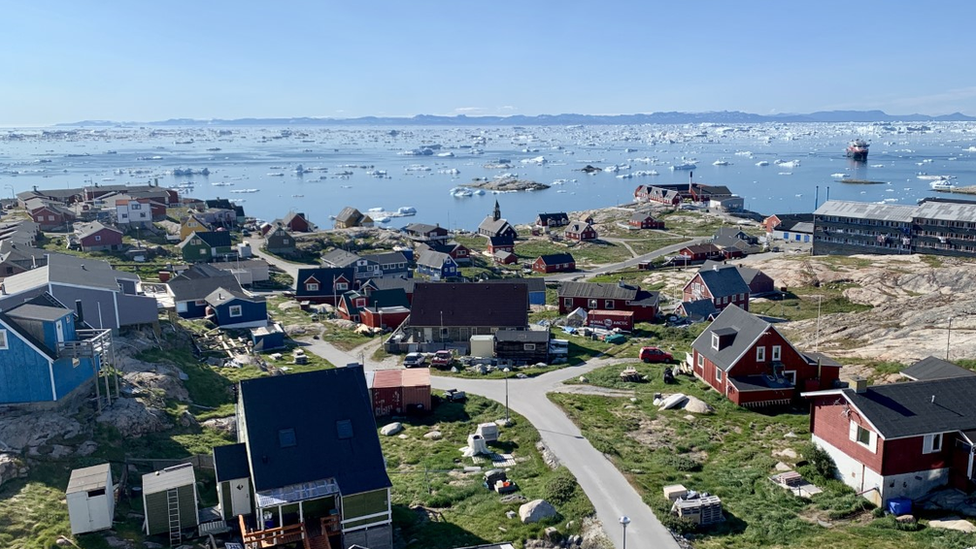
Ilulissat means iceberg in Greenlandic. Climate change has brought changes to the town
"The dog-sled fishermen has declined. But the fishing from vessels has gone up," says Erik Sivertsen, CEO of Halibut Greenland. "Climate change has made the opportunity for our local fishermen to have a greater turnover."
It's still a worry, he emphasises. "Of course it's very concerning."
"Now it [the glacier] has receded so much that icebergs are not that big. You might think they are big, but they not as big as when we grew up," he says.
New shipping routes are expected to open up further north. Mining exploration firms have also been drawn to Greenland, anticipating that mineral deposits will become more accessible.
Meanwhile glacial melting is leading to large deposits of sand along the coast, and a recent survey, external found that three-quarters of residents support extracting and exporting it.
Research by the Universities of Copenhagen and Greenland, external carried out before the pandemic found that 90% of Greenlanders think that climate change is happening. Three-quarters felt they had personally experienced its effects, and a large majority said it was an important issue to them personally.
While these observations are mostly anecdotal, scientists have given stark warnings about the impact of global warming on Greenland's ice sheet.
Currently its meltwater adds 1.5mm to global sea level annually. Recently, a group of scientists predicted, external that even if action is taken to curb emissions, a rise of at least 27cm is inevitable. If the ice sheet thawed entirely this would be more than 7m (23ft).
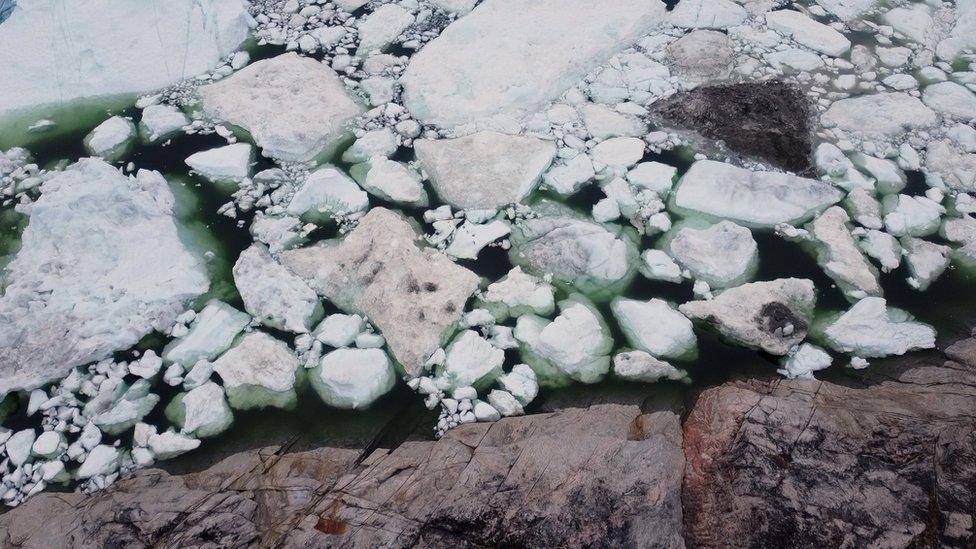
More icebergs are produced in Greenland than anywhere else in the northern hemisphere
"In the late 90s it was in balance," explains Alun Hubbard, a glaciologist at Arctic University of Norway. "At the moment it's a system that's in deficit. The amount of snow falling can't keep up with the melt and iceberg calving."
"What I've come to understand in the last 10 years having observed what's going on here," the scientist adds, "is that there are really, really abrupt changes going on."
In a coffee shop in the capital Nuuk, 21-year-old Iluuna Soerensen, a student and activist says, "When you're from Greenland, you're so closely linked to nature that all the changes, you see them quite clearly."
Skills and knowledge have been handed down from elders, she explains. "If that knowledge is not correct anymore because nature is changing, it's quite concerning."
"People do get scared that their future is changing so much," she adds. "But also the present."
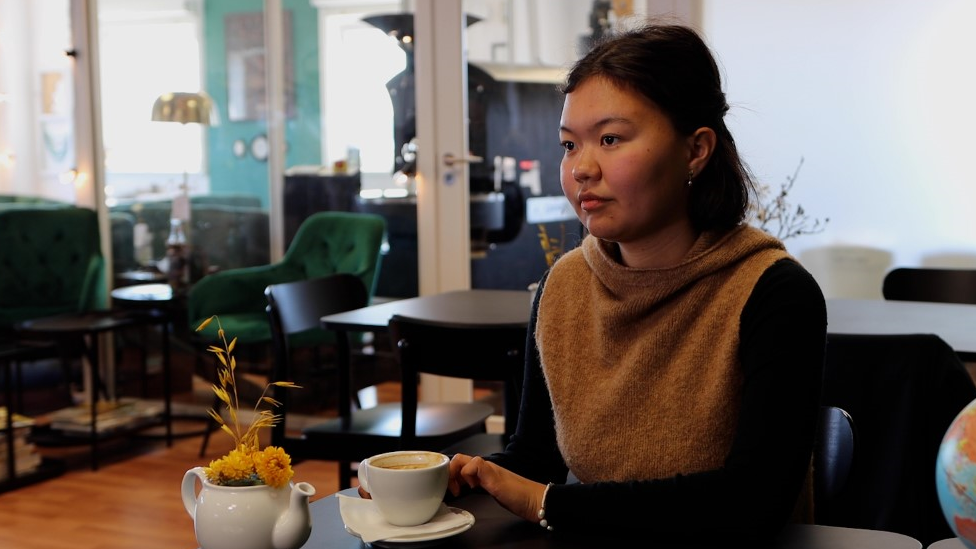
Activist Iluuna Soerensen says Greenlanders can be scared by the changes they can see
All photos copyright BBC.
Related topics
- Published25 October 2021
